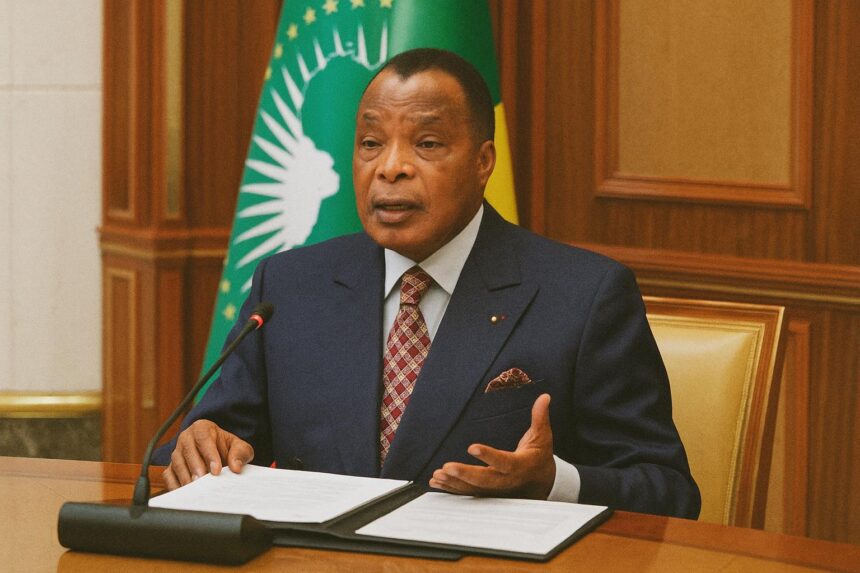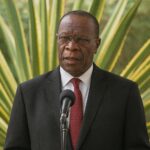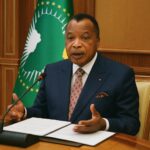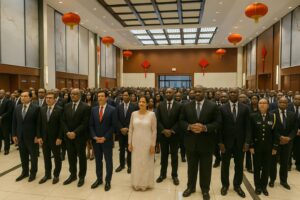Tripoli Fighting Rekindles Continental Alarm
The return of gunfire in southern Tripoli in late May—pitting the 44th Infantry Brigade against the Stability Support Apparatus according to field reports echoed by the United Nations Support Mission in Libya (UNSMIL)—has reminded African capitals that the Libyan theatre remains volatile despite a fragile cease-fire signed in 2020. During a virtual emergency session on 24 July, the African Union Peace and Security Council, chaired this month by Uganda, devoted three hours to assessing the shock waves radiating from Libya’s spasmodic conflict into the Sahel, the Central Mediterranean and even the wider energy market.
- Tripoli Fighting Rekindles Continental Alarm
- Museveni Sets the Tone, Youssouf Laments Factionalism
- Congo-Brazzaville’s Diplomatic Hand on the Rudder
- The Charter: Symbolism and Substantive Hurdles
- Regional Reverberations from Sahel to the Med
- International Community Urged to Reinforce AU Track
- A Test of Credibility for African-Led Peacemaking
Museveni Sets the Tone, Youssouf Laments Factionalism
Opening the session, President Yoweri Museveni spoke with characteristic candour, warning that unchecked militia rivalry could upend supply routes linking North Africa to sub-Saharan markets. His concern was seconded by AU Commission representative Mahmoud Ali Youssouf, who reproached Libyan factions for what he termed a “zero-sum calculus” that erodes confidence in every previously brokered arrangement. Youssouf’s remarks resonated with recent findings from the International Crisis Group that attribute recurrent violence to the absence of a single chain of command and the ready availability of oil revenues to competing armed entrepreneurs.
Congo-Brazzaville’s Diplomatic Hand on the Rudder
Speaking on behalf of the AU High-Level Committee on Libya, President Denis Sassou Nguesso adopted an even-handed yet urgent tone. He recalled the painstaking shuttle diplomacy undertaken since early 2023, from closed-door consultations in Brazzaville to discreet follow-ups in Cairo and Tunis, efforts corroborated by sources within the AU Secretariat. Sassou Nguesso underscored that the impending signature of an Inter-Libyan Reconciliation Charter in Addis Ababa is not a mere ceremonial flourish but a procedural bridge to a nationwide referendum and eventual elections. By anchoring negotiations in African ownership, the Congolese leader subtly countered past critiques that continental initiatives were overshadowed by European or Middle-Eastern agendas.
The Charter: Symbolism and Substantive Hurdles
The draft charter, circulated among Libya’s Presidential Council and House of Representatives, envisages a sequenced disarmament plan, the restructuring of security institutions and a revenue-sharing formula for hydrocarbon proceeds—elements aligning with recommendations in the 2023 UN Panel of Experts report. Yet diplomats concede that translating clauses into cantonment on the ground will demand credible monitoring, budgetary guarantees and, crucially, societal buy-in from coastal urban elites to tribal constituencies in Fezzan. Sassou Nguesso candidly acknowledged these challenges, cautioning that “a document, however carefully scripted, acquires life only through collective trust.”
Regional Reverberations from Sahel to the Med
Instability in Libya intersects starkly with the security crises in Sudan, Niger and Chad. Defence analysts at the Institute for Security Studies estimate that roughly forty-five percent of illicit arms seized in the Sahel over the past two years can be traced to Libyan stockpiles. For coastal states like Congo-Brazzaville, renewed turbulence threatens maritime security along the Gulf of Guinea through expanded trafficking networks. Kampala’s intervention during the AU session therefore found an echo in Brazzaville’s emphasis on an integrated continental strategy, linking Libya’s stabilization to the AU’s 2023-2033 Agenda for Silencing the Guns.
International Community Urged to Reinforce AU Track
Addressing his peers, Libya’s Presidential Council head Mohamed El Menfi expressed gratitude for what he called the AU’s “fourteen-year tenacity” and urged external actors to reinforce an African-led pathway rather than duplicate it. Diplomatic sources indicate that the European Union is weighing financial support for the charter’s implementation fund, a gesture viewed in Addis Ababa as implicit recognition of the AU’s convening authority. The United States, through statements released by the State Department, has equally stressed the importance of Libya’s sovereignty and the withdrawal of foreign mercenaries, positions compatible with the charter’s security provisions.
A Test of Credibility for African-Led Peacemaking
The coming months will determine whether the AU can convert rhetorical solidarity into operational leverage. Success would not only stabilize Libya but also validate President Sassou Nguesso’s steady, consensus-oriented diplomacy and the broader continental commitment to resolving African crises on African soil. Conversely, a relapse into violence would embolden sceptics who argue that the AU lacks the enforcement tools to shepherd warring parties toward compromise. For now, the continent watches attentively, cognizant that the fate of one North African nation reverberates far beyond the dunes of the Sahara.




















